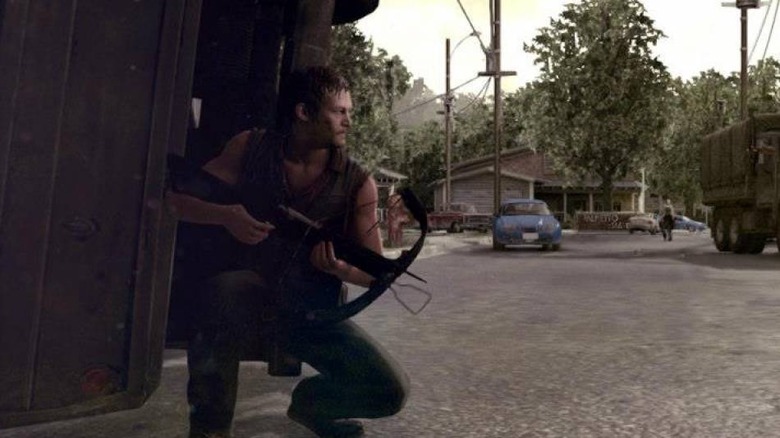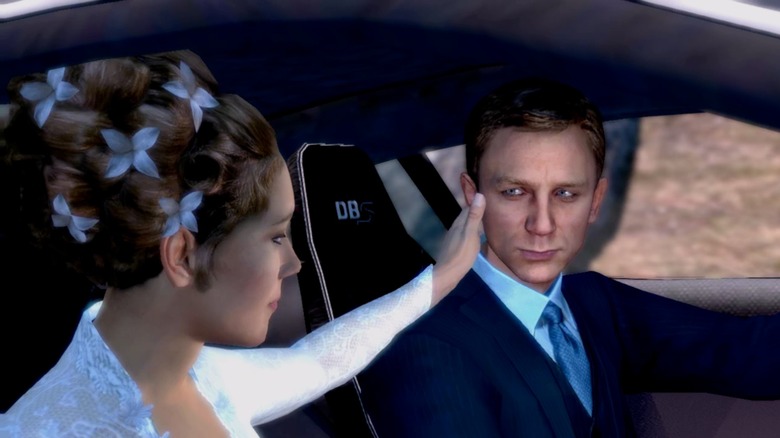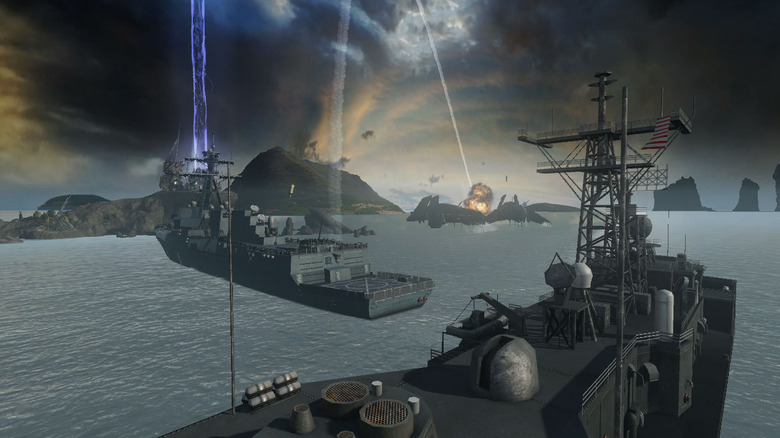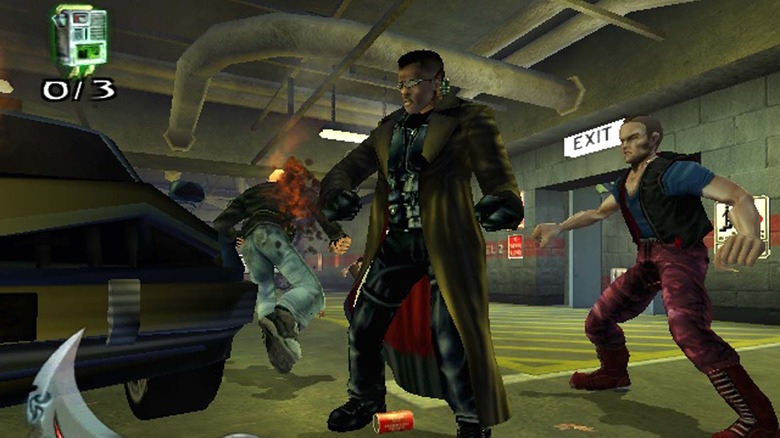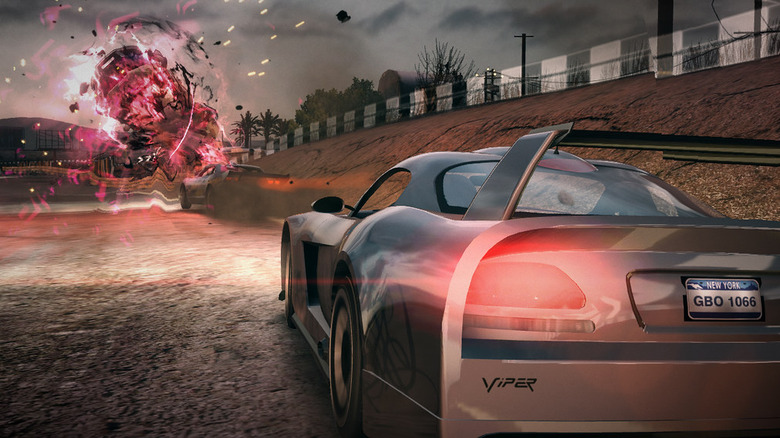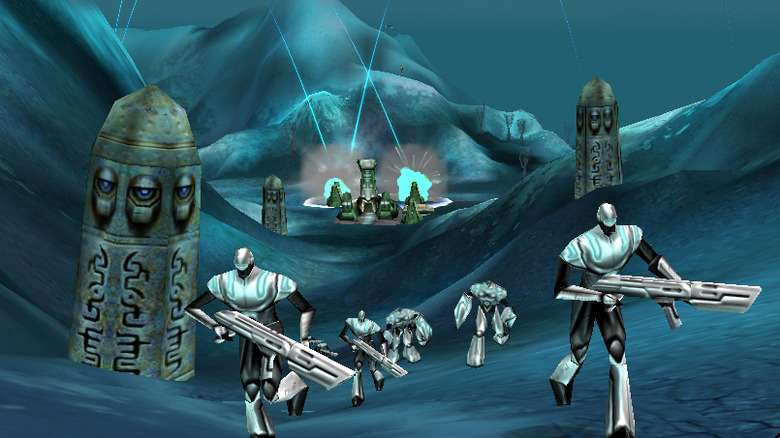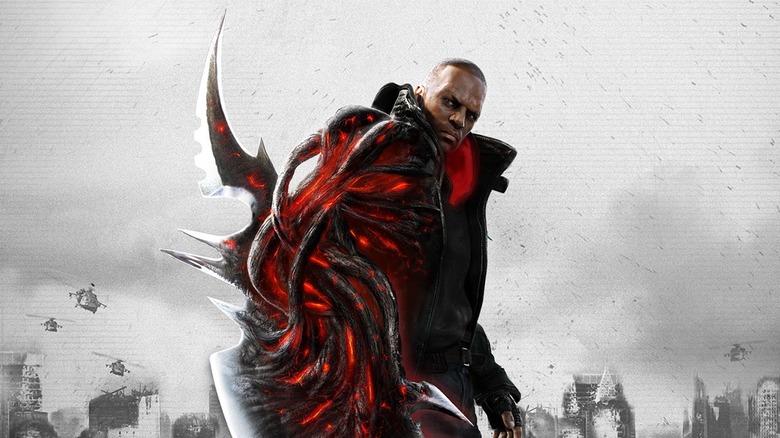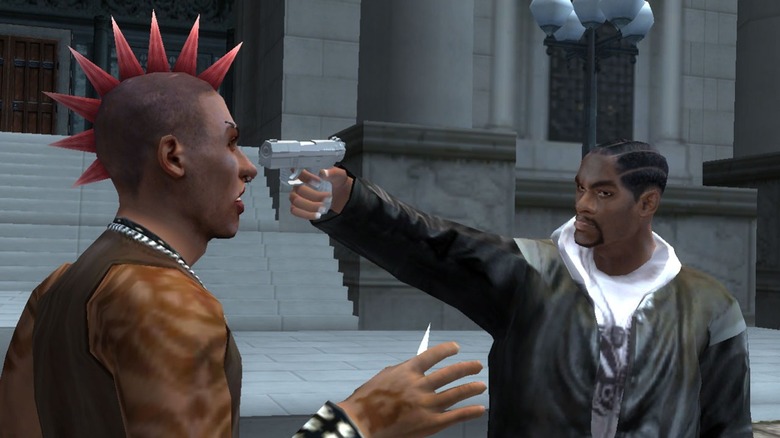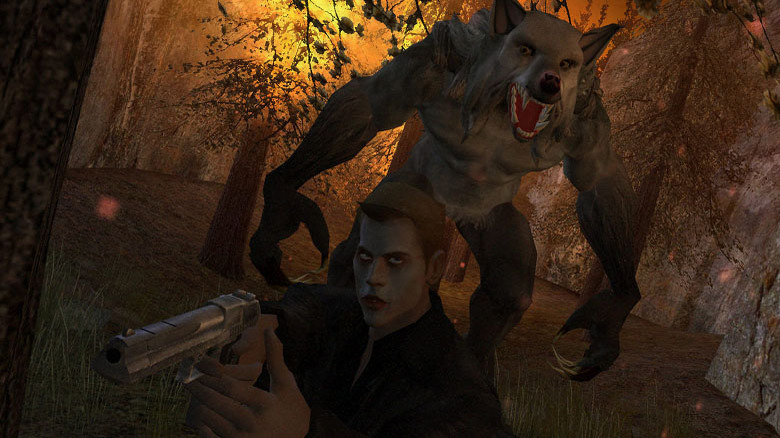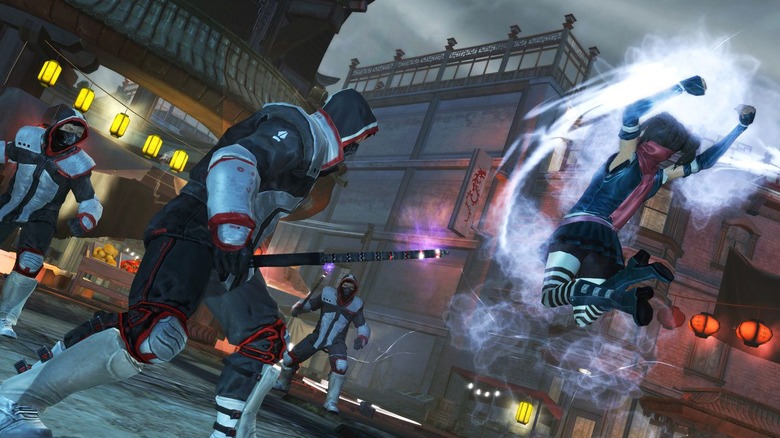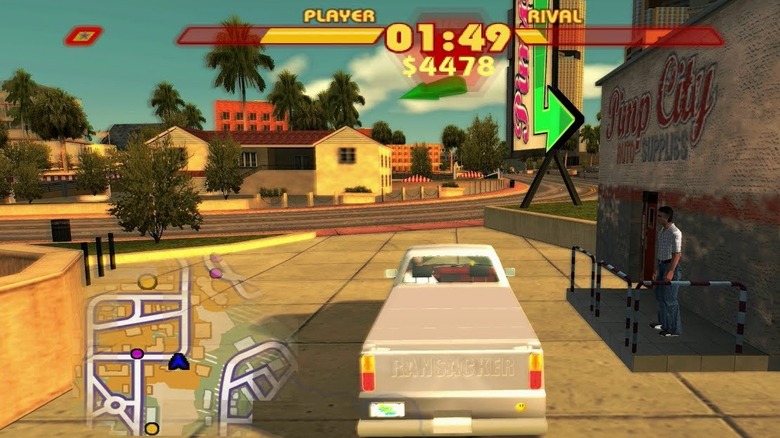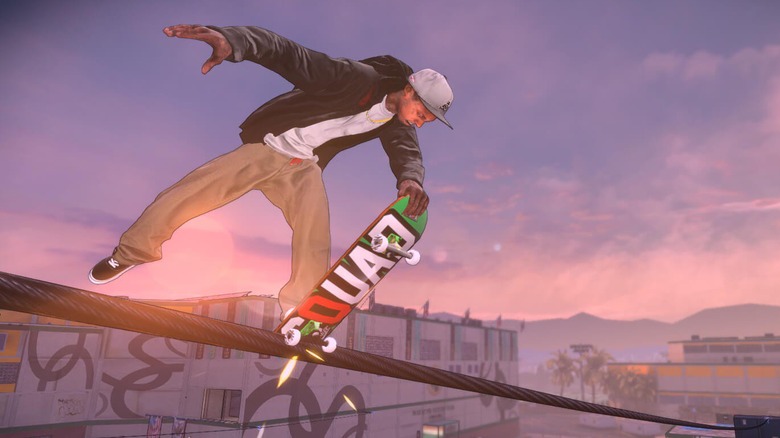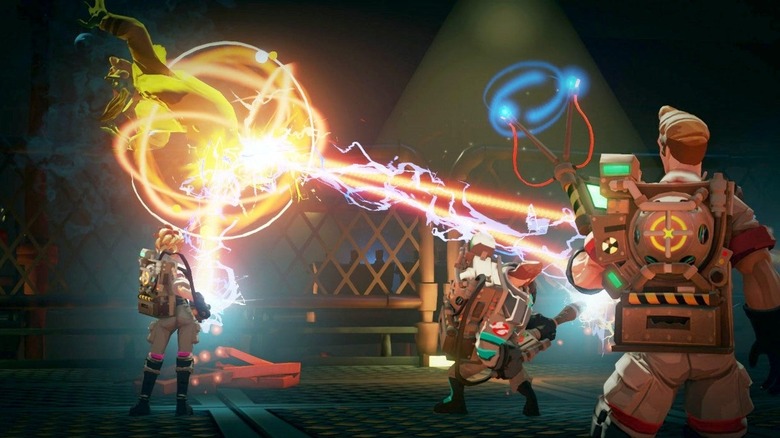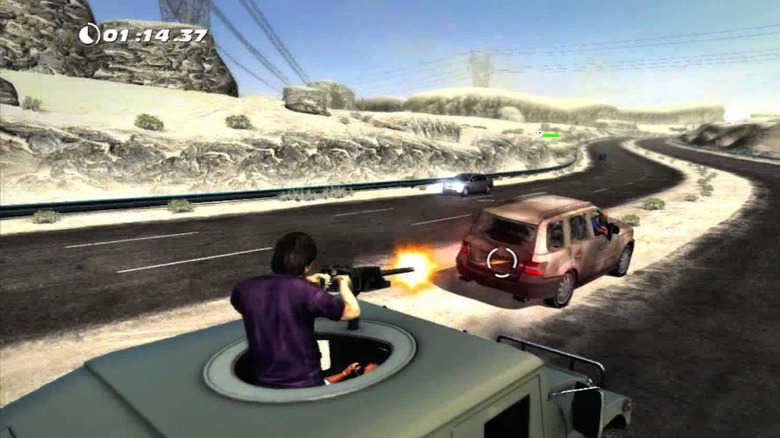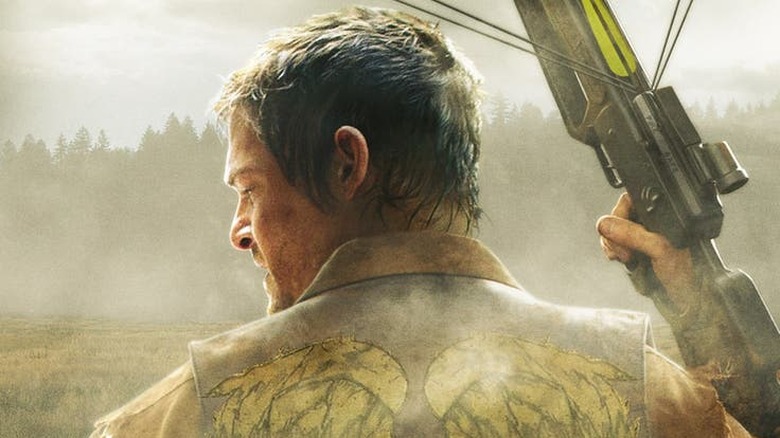Activision Blizzard Games That Totally Flopped Hard
Activision Blizzard is a well-respected publisher that has put out some of the biggest hits of all time, including franchises like Guitar Hero, Call of Duty, Diablo, and Overwatch. Even the mobile market isn't out of their grasp, as they own King Digital Entertainment, the folks behind the inescapable Candy Crush.
Basically, any Activision Blizzard release is a big deal in the industry and should be treated as such. However, that doesn't mean that everything they've had their hands in has been a winner. Every now and then, a major disappointment can slip through the cracks and into the hands of unsuspecting fans. Whether they're uninspired tie-in games, broken and buggy original properties, or just genuinely good games that sadly didn't find their audience, there are more than a few blemishes on Activision Blizzard's impressive record. Here are some of those less fortunate titles, as well as why they might not have caught on with gamers.
007 Legends
2012's 007 Legends had a really intriguing premise: reimagining classic Bond adventures like Moonraker and Goldfinger with current Bond actor Daniel Craig's likeness and voice in the place of Sean Connery, Roger Moore, and the rest. In theory, it doubled as a fun way to adapt older Bond films for a new audience and as a way of celebrating the film series' 50th anniversary. In reality, it spelled the end of Activision's 007 video games.
As noted by Eurogamer, 007 Legends "was panned by critics and failed to make a mark on sales charts." Reviews were critical of the game's plot inaccuracies compared to the original films, as well as the generally uninspired gameplay and level designs. Following 007 Legends' negative critical reception and poor commercial performance, nearly all of its development team at Eurocom was laid off, citing "financial difficulties" as the reason. In early 2013, 007 Legends was removed from digital retailers like Steam, along with the rest of Activision's James Bond library. Activision never made a Bond game again and has mostly steered clear of licensed products ever since.
Battleship
The Battleship film was released in the same summer as the first Avengers film, which meant that the adaptation of the classic board game kind of had the deck stacked against it from the start. It also didn't help that the movie was savaged by critics, something that it has in common with its video game adaptation. Yes, we are in fact speaking of the board game-turned-movie-turned-video game, Battleship.
Though the game had some cool ideas, combining real-time strategy and shooter elements, the final product was an underwhelming mess. None of the game's disparate gameplay elements were executed to their full potential, disappointing FPS and RTS fans alike. Battleship was also knocked by critics for the painfully short length of the game, with GameSpot saying, "There are only seven redundant missions and no alternate modes available to keep you busy when you're done with the campaign." There was just nothing for audiences to grab onto. In other words, Battleship was the Battleship of video games.
Blade 2
Not only was Blade 2 a bad game, but it has a sad tale attached to it. As explained to The Escapist by Mike Diskette, formerly of Mucky Foot, the development team behind Blade 2, a string of flops had left the company in dire straits. They took the project for publisher Activision as a way of keeping Mucky Foot afloat, delivering a game with an intriguingly outside the box control scheme for a tie-in action title. In an attempt to mimic Blade's free-flowing combat from the vampiric action films, Blade 2 utilized the analogue sticks to target enemies on all sides of him, a decision that IGN said "isn't quite on the intuitive side." That's a pretty diplomatic way of saying that the controls weren't great in practice.
The game's production was rushed so that its release could coincide with the DVD release of the film. It was not well received by critics and sold poorly, but that wasn't the end of Mucky Foot's Blade 2-related woes. They were meant to make a Punisher video game for THQ, but the license was taken from them following the poor reception of this game. Within the next year, Mucky Foot closed their doors for good.
Blur
This one is a real bummer. Rather than being some subpar tie-in, Bizarre Creations' Blur was an original IP and a pretty darn good game. Blur was a combat racing game with a gorgeous visual style and gameplay based around arcade-style power ups and controls. It was well liked by critics, with IGN UK calling it "an amazing Frankenstein of a game" and "completely unique."
Unfortunately, Blur didn't exactly meet Activision's sales expectations. It was posited by Activision's Dan Amrich that this was due to Blur being released around the same time as two other racing games, Split/Second and ModNation Racers. Sadly, Activision closed down Bizarre Creations in late 2010, explaining that they had "made a substantial investment" in the production of Blur but "it did not find a commercial audience." With the closure of Bizarre Creations, the sequel to Blur, which would have featured new weapons and cool weather effects, was also canned.
Dark Reign 2
This RTS acted as a prequel to the first Dark Reign and its expansions, which were well liked but didn't exactly dominate the sales charts. One possible reason for this was pointed out by Eurogamer, who mentioned that the first Dark Reign was released around the same time as fellow sci-fi RTS Total Annihilation, and was unfortunately "quickly written off as just another Command & Conquer clone." This lack of audience interest may have spread to the prequel.
Whatever the case, Dark Reign 2 followed a few years later and received decent reviews, with critics praising it for its graphics and its solid storyline and worldbuilding, as well as its intuitive interface. Despite the positive reviews, Dark Reign 2 was also notable for its shockingly low sales. The game sold less than 10,000 copies within its first three months of release, a number that GameCenter noted "Activision [had] to be disappointed with." This severe underperformance is likely the reason that the Dark Reign series hasn't seen another entry in over a decade.
Prototype 2
The marketing rollout for Prototype 2 was a pretty significant affair, with a pretty wild live action trailer produced and several comic books released which expanded the world of the games. Unfortunately, Prototype 2 failed to catch on with gamers. The reviews were fairly decent, with the general consensus being pretty similar to IGN's review, which referred to the game as "an enjoyable but predictable action title." Prototype 2 was the top-selling game during the month of its initial release. Ultimately, though, it did not achieve the sales numbers that Activision had hoped to see.
Following Prototype 2's disappointing reception, it was announced that Radical Entertainment would see the majority of its staff laid off, with the remaining employees being reassigned to other Activision projects. Activision released a statement regarding the restructure of Radical Entertainment: "Although we made a substantial investment in the Prototype IP, it did not find a broad commercial audience."
True Crime: New York City
The sequel to True Crime: Streets of LA was just as much of an unabashedly silly GTA clone as its predecessor. Unfortunately, it was much less playable than Streets of LA, as New York City was a buggy mess. GameSpot's review of the GameCube release of the game criticized the nonsensical behavior of NPCs and the clunky combat and controls: "True Crime: New York City is so riddled with problems that it feels like it was rushed to make it to store shelves in time for the holidays."
Though Activision said that New York City sold below their expectations, they did announce a new installment a few years later, True Crime: Hong Kong, which had more of a classic martial arts movie feel to it. However, possibly due to the lukewarm reception of the previous game, Activision cancelled Hong Kong during its development. There was a happy ending of sorts to the True Crime story, though: in 2011, Square Enix purchased the rights to the unfinished True Crime: Hong Kong and gave it a new lease on life, resulting in 2012's Sleeping Dogs.
Vampire: The Masquerade — Bloodlines
Vampire: The Masquerade — Bloodlines was a horror-RPG title from developers Troika Games that dropped players into a complex world of warring vampire clans. Much like the poor sap who finds themselves on the wrong end of an vampire's fangs, however, Bloodlines and its developers both met an unfortunate end.
According to the game's lead writer Brian Mitsoda, Bloodlines was released unfinished and barely marketed. As he explained, "It was dumped on the market at the worst possible time – most people didn't even know we were out." The creative director of the game, Jason Anderson, told The Escapist that Activision took the game from Troika and released it without proper testing. Whatever the case, the game failed to light up the charts and ultimately led to Troika's closure a few months after the release of Bloodlines.
Despite this, Bloodlines has become a cult classic, respected for its ambition and its writing and mostly forgiven for its many, many flaws. It even earned a sequel, albeit more than a decade later.
X-Men: Destiny
The premise behind X-Men: Destiny was an intriguing one. This action-RPG from developers Silicon Knights put players in the role of original mutant characters, using their powers and making decisions in ways that affected the outcome of the game, as well as whether or not they joined the X-Men or Magneto's Brotherhood of Mutants. The game was a complete disaster, however.
It appears that several internal factors led to the subpar final product that was X-Men: Destiny. The working conditions at Silicon Knights were reportedly extremely hostile during development, for one. Team morale was very low and feedback from Activision was allegedly "delayed" fairly often, resulting in the game falling behind schedule and going over budget. Whatever the issues behind the scenes, the result was that X-Men: Destiny was ultimately a critical and financial failure.
To make the failure of X-Men: Destiny even more complete, the game was recalled and destroyed. This action was the result of a lawsuit between Silicon Knights and Epic Games, in which is was ruled that Silicon Knights had "repeatedly and deliberately copied significant portions of Epic Games's code containing trade secrets" when they created the game engine that ran X-Men: Destiny.
Pimp My Ride
Yo dawg, we heard that you like terrible video games. Just kidding; no one was asking for this.
An adaptation of the (apparently super fake) MTV series in which rundown cars were restored and spruced up with wacky new features, this release attempted to combine driving game mechanics with the kind of customization seen in the series. That's a fun idea in concept, but boy, is the game an ugly sight to behold. In their review of the PSP version of the game, GameSpot remarked that there was "no version of Pimp My Ride worth recommending to anyone." They also noted that the game would constantly corrupt or delete your save files on its own, as though it were begging you to stop playing.
Somehow, this universally unloved game received a sequel in 2009, called Pimp My Ride: Street Racing, also published by Activision. However, that one didn't fare much better in the eyes of critics. Maybe this is one franchise that was better off not being adapted to video games, dawg.
Tony Hawk's Pro Skater 5
Tony Hawk's Pro Skater 5 is not only a terrible game, but also the sad final word from the once-proud franchise. The first red flag for fans came when Pro Skater 5 was released in 2015 with little in the way of promotion and without any review copies provided for critics (never a good sign). It could be that Pro Skater 5 was rushed to market and essentially left to die because Activision was due to lose the license at the end of 2015.
Whatever the reasoning behind this less-than-enthusiastic release strategy, the game was still savaged by critics. The game came in an unfinished state with a day one patch that was nearly twice the size of the base game file. Essentially, players had to download this update to make Pro Skater 5 even somewhat playable. It was a disaster.
The game's online servers were shut down a couple of years after release. Since most of the game required an internet connection to play, it essentially rendered the game entirely unplayable for the few folks who still wanted it.
Ghostbusters (2016)
Strangely enough, this game wasn't an adaptation of the reboot film released the same year. Nor was it a sequel to the exceptional 2009 game. Instead, it followed yet another new cast of Ghostbusters as they tried to tackle all of the creepy crawlies in their city. Reviews for this top-down ghostbusting shooter were pretty harsh. Polygon's review called the game out for its paper-thin story and complete lack of personality, as well as its repetitive level design and awful controls: "Ghostbusters is a deplorable, cynical bit of licensed drivel that wouldn't be worth the $50 asking price if the instruction manual were printed on a $50 bill."
As if the reviews weren't a clear enough sign of the game's failure, the studio that developed it, Fireforge, declared bankruptcy just a few short days after the release of the game. Clearly, nobody involved was firing on all cylinders during Ghostbusters' eight-month development cycle.
Fast & Furious: Showdown
Much like the many, many cars in the movies, the Fast and the Furious franchise seems to be in no danger of slowing down anytime soon. Unfortunately for gamers who love the wild Vin Diesel action series, this adaptation is a total mess. First of all, fans of the films may be disappointed to note that Vin Diesel's character Dominic Toretto isn't even in the game, despite the fact that the game's missions re-enact several action set pieces from the films. Secondly, the game itself is quite broken.
This game was torn to shreds by critics and fans alike. IGN said, "Fast & Furious: Showdown fails on practically every level ... This feels like the bare minimum for what it takes to be a racing game." They particularly took it to task for its buggy graphics and poor collision detection, as well as its repetitive and "banal" missions. It has been argued that the source material could actually make for a great game, but Showdown sure isn't it.
The Walking Dead: Survival Instinct
The Walking Dead is a multimedia phenomenon that has not only shambled from comics to television, but also made the jump to video games more than once. While Telltale Games' The Walking Dead is rightly celebrated, there was a game adaptation that didn't fare quite so well in the eyes of critics and fans. That game was The Walking Dead: Survival Instinct. Though it notably starred Norman Reedus and Michael Rooker reprising their roles from the television series, Survival Instinct was torn apart by critics, many of whom perceived the game as a poorly made and uninspired cash grab.
In a Reddit AMA, The Walking Dead creator Robert Kirkman distanced himself from the game. After being asked by a Redditor how he could have allowed Survival Instinct to be made, Kirkman said, "I'm pretty sure there's an AMC logo before the title of that game and not a picture of my face ... I can only oversee/be involved in so much... and my efforts were focused more on the TELLTALE games series."

